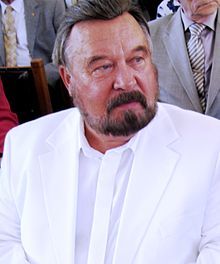Ülo Nugis
Ülo Nugis | |
|---|---|
 Nugis in 2009 | |
| Speaker of Riigikogu | |
| In office 21 October 1992 – 21 March 1995 | |
| Preceded by | Otto Pukk (Riigivolikogu) Mihkel Pung (Riiginõukogu) |
| Succeeded by | Toomas Savi |
| Personal details | |
| Born | 28 April 1944 Tallinn, Estonia |
| Died | 18 November 2011 (aged 67) Tallinn, Estonia |
| Spouse | Vaike Nugis |
| Children | 1 |
Ülo Nugis (28 April 1944 – 18 November 2011) was an Estonian politician and economist. As Speaker of the Supreme Council of Estonia on 20 August 1991, he presided over the Supreme Council's historic session when it voted for the restoration of Estonia's national independence from the Soviet Union.
Early life
[edit]Ülo Nugis was born on 28 April 1944 in Tallinn. He studied at Tallinn Technical Secondary School for Building and Mechanics from 1958 to 1962, at Tallinn Polytechnic Institute from 1962 to 1965, and finally at Belarusian State Polytechnic Institute from 1965 to 1967 graduating in mechanical engineering.[1][2]
Career
[edit]Nugis worked as a teacher at Tallinn Technical Secondary School for Building and Mechanics from 1967 to 1968, and at various positions in the Pioneer and Tegur factories from 1968 to 1974. In 1974, Nugis became director of the building materials factory Ehitusdetail, and in 1980 director of a ski factory, Dünamo.[1] In 1986, he became director of the Estoplast factory. Under his leadership, central Soviet Union control of Estoplast was transferred to local Estonian control in 1988. Together with other Estonian-minded industrial leaders, Nugis formed the Union of Work Collectives (Estonian: Eesti Töökollektiivide Liit) where he became the leader.[3]
In 1990, Nugis was elected to the Estonian Supreme Council at the first mostly free elections, becoming Speaker.[4] That same year, he left the Communist Party and founded the Republican Coalition Party.[5] On 20 August 1991, he presided over the Supreme Council's historic session where it voted to restore Estonia's national independence, with the gavel strike by Nugis confirming the result.[6] In October, Nugis became the first Estonian politician to publicly state that the country should try to join NATO as soon as possible, even as Soviet troops were still present in the Baltic nation.[7]

In 1992 he became the speaker of the newly elected Riigikogu.[5] Over the years he was in multiple different parties, including the Pro Patria National Coalition Party, People's Party of Republicans and Conservatives, and the Estonian Coalition Party. After splitting from the latter, he created the New Estonia party, which he led from 2001 to 2003 before merging it into the People's Union of Estonia.[2][8] At the same year Nugis retired from politics.[9]
Nugis was a member of the 20 August Club which is an organization that is composed of the former members of the Supreme Council who had voted for the restoration of Estonian independence.[2]
Personal life
[edit]Nugis and his wife, Vaike, had a son, Uno.[1]
Death
[edit]Nugis died on 18 November 2011. The funeral at Charles' Church in Tallinn was attended by Estonian presidents Toomas Hendrik Ilves and Arnold Rüütel, among others. The coffin was covered with the Estonian flag that had flown over Pikk Hermann on 20 August that year.[10] Nugis was buried at Metsakalmistu cemetery.[11]
Awards
[edit]Nugis was awarded Order of the National Coat of Arms 4th class in 2001 and 2nd class in 2004, and memorial medal “10 years of restoration of the Defence Forces” in 2001.[12][13][14]
References
[edit]- ^ a b c Kello, Karl (28 April 1999). "Nugis otsustab ise ja vastutab" (in Estonian). Eesti Päevaleht. Retrieved 1 August 2018.
- ^ a b c "Suri riigikogu endine esimees Ülo Nugis" (in Estonian). Postimees. 18 November 2011. Retrieved 1 August 2018.
- ^ Kruut, Margus (21 November 2011). ""Mihhail Sergejevitš, nad kavatsevad Nõukogude Liidu ära lõhkuda!"" (in Estonian). Postimees. Retrieved 1 August 2018.
- ^ "Supreme Soviet of the ESSR/ Supreme Council of the Republic of Estonia". Riigikogu. 3 March 2016. Retrieved 1 August 2018.
- ^ a b Koppel, Karin (18 November 2011). "Suri riigikogu endine esimees Ülo Nugis" (in Estonian). Eesti Rahvusringhääling (Estonian Public Broadcasting). Retrieved 2 August 2018.
- ^ Vahtla, Aili (20 August 2017). "Taking back what was theirs: Estonia's independence restored in August 1991". Eesti Rahvusringhääling (Estonian Public Broadcasting). Retrieved 15 August 2018.
- ^ Praks, Henrik (2014). "Estonia's First Steps in the Direction of NATO and National Defence". Estonian Yearbook of Military History. 4: 118. Retrieved 2 August 2018.
- ^ "Nugis ühendab oma erakonna Rahvaliiduga" (in Estonian). Delfi. 8 May 2002. Retrieved 2 August 2018.
- ^ Soonvald, Urmo (19 August 2006). "Ülo Nugis kuulutas iseseisvuse välja, püstol hõlma all" (in Estonian). Õhtuleht. Retrieved 2 August 2018.
- ^ Raun, Alo (26 November 2011). "Ülo Nugise sarka kattis 20. augusti lipp" (in Estonian). Postimees. Retrieved 1 August 2018.
- ^ Teder, Merike (31 October 2012). "Hallaste sängitatakse riigikogulaste matmispaika" (in Estonian). Postimees. Retrieved 1 August 2018.
- ^ "Teenetemärkide kavalerid" (in Estonian). Office of the President. Retrieved 1 August 2018.
- ^ "The President of the Republic handed over state decorations". Office of the President. 23 February 2004. Retrieved 1 August 2018.
- ^ Keian, Allan (31 October 2001). "Kaitseväe juhataja annab kätte kaitseväe taastamise mälestusmedalid" (in Estonian). Postimees. Retrieved 1 August 2018.
- 1944 births
- 2011 deaths
- Politicians from Tallinn
- Estonian engineers
- Voters of the Estonian restoration of Independence
- People of the Singing Revolution
- Tallinn University of Technology alumni
- Members of the Riigikogu, 1992–1995
- Members of the Riigikogu, 1995–1999
- Members of the Riigikogu, 1999–2003
- Speakers of the Riigikogu
- Leaders of political parties in Estonia
- People's Party of Republicans and Conservatives politicians
- 21st-century Estonian politicians
- Burials at Metsakalmistu
- Recipients of the Order of the National Coat of Arms, 4th Class
- Recipients of the Order of the National Coat of Arms, 2nd Class
